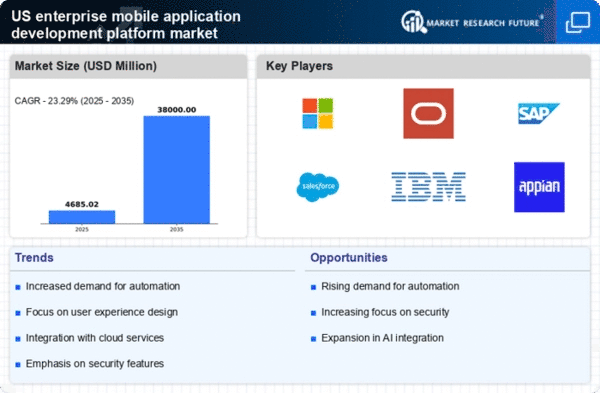Integration of Cloud Technologies
The integration of cloud technologies is significantly influencing the enterprise mobile-application-development-platform market. As businesses increasingly migrate to cloud-based solutions, the demand for mobile applications that leverage cloud capabilities is on the rise. This shift allows for enhanced scalability, accessibility, and collaboration among teams. Data shows that approximately 80% of enterprises in the US are adopting cloud technologies, which in turn drives the need for mobile applications that can seamlessly integrate with cloud services. Consequently, the enterprise mobile-application-development-platform market is likely to benefit from this trend, as organizations seek platforms that facilitate the development of cloud-compatible mobile applications.
Growing Demand for Mobile Solutions
The enterprise mobile-application-development-platform market experiences a notable surge in demand for mobile solutions as organizations increasingly recognize the necessity of mobile accessibility. This trend is driven by the need for real-time data access and enhanced communication among employees. According to recent data, approximately 70% of enterprises in the US are prioritizing mobile application development to improve operational efficiency. The shift towards mobile-first strategies is compelling businesses to invest in platforms that facilitate rapid development and deployment of mobile applications. As a result, it is likely to expand, catering to the evolving needs of businesses seeking to enhance their mobile capabilities.
Emphasis on Data Analytics and Insights
The enterprise mobile-application-development-platform market is experiencing a heightened emphasis on data analytics and insights. Organizations are increasingly recognizing the value of data-driven decision-making, prompting them to seek mobile applications that can provide real-time analytics. This trend is leading to a demand for development platforms that incorporate advanced analytics capabilities, enabling businesses to derive actionable insights from their mobile applications. Recent findings indicate that companies leveraging data analytics in their mobile solutions can improve decision-making processes by up to 25%. As a result, the enterprise mobile-application-development-platform market is likely to see growth as organizations prioritize platforms that enhance their analytical capabilities.
Increased Focus on Employee Productivity
In the enterprise mobile-application-development-platform market, there is a growing emphasis on enhancing employee productivity through mobile applications. Organizations are increasingly adopting mobile solutions to streamline workflows and improve collaboration among teams. Data indicates that companies utilizing mobile applications report a productivity increase of up to 30%. This trend is prompting businesses to invest in development platforms that enable the creation of tailored applications, thereby addressing specific operational challenges. As enterprises seek to optimize their workforce efficiency, the demand for robust mobile application development platforms is expected to rise, further driving growth in the market.
Rising Need for Customization and Flexibility
The enterprise mobile-application-development-platform market is witnessing a rising need for customization and flexibility in application development. Organizations are increasingly seeking platforms that allow for tailored solutions to meet their unique business requirements. This demand is fueled by the realization that off-the-shelf applications often fail to address specific operational needs. As a result, the market is evolving to offer platforms that support customizable features and integrations. Recent statistics suggest that over 60% of enterprises in the US prefer platforms that provide extensive customization options. This trend indicates a shift towards more adaptable development environments, which is likely to enhance the appeal of the enterprise mobile-application-development-platform market.
















